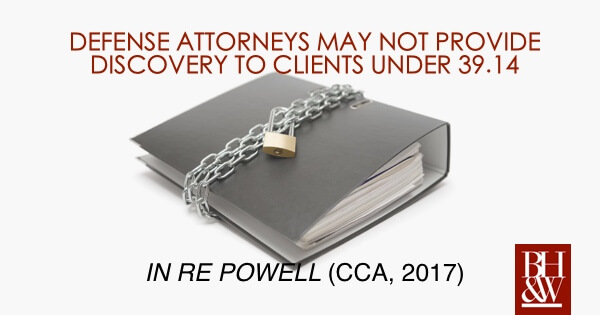
May a Court Order that an Attorney Can Provide Copies of Discovery to a Client Pursuant to the Michael Morton Act?
 The Court of Criminal Appeals recently handed down an opinion on a petition for writ of mandamus in regard to a discovery dispute arising out of Article 39.14 of the Texas Code of Criminal Procedure —otherwise known as the Michael Morton Act. The central issue facing the Court was whether the relator (a party who has standing and on whose behalf a writ of mandamus is petitioned for by the state as plaintiff) satisfied the criteria to justify mandamus relief.
The Court of Criminal Appeals recently handed down an opinion on a petition for writ of mandamus in regard to a discovery dispute arising out of Article 39.14 of the Texas Code of Criminal Procedure —otherwise known as the Michael Morton Act. The central issue facing the Court was whether the relator (a party who has standing and on whose behalf a writ of mandamus is petitioned for by the state as plaintiff) satisfied the criteria to justify mandamus relief.
See the full opinion in In re Powell v. Hocker (NO. WR-85,177-01)
The Facts—Trial Judge Granted Defendant’s Motion to Release Discovery.
Ellen Wilson, the real party of interest, was charged with misdemeanor DWI in the County Court at Law in Lubbock, Texas. Wilson’s attorney obtained discovery pursuant to Article 39.14 and filed a motion to “release” Wilson from the prohibition contained in subsection (f) of the statute. Subsection (f) of Article 39.14 permits a defense attorney to “allow a defendant . . . to view the [discovery] information provided under this article,” but the defense attorney “may not allow” the defendant “to have copies of the information provided[.]”
In the brief filed in support of the motion, Wilson’s attorney prayed that the County Court at Law would “permit defense counsel to give her a properly redacted copy of the requested items of the State’s evidence.” The brief did not maintain that Wilson had been unable to “view” the discovery in the attorney’s possession, as the statute expressly permits. Rather, it asserted that it was important for Wilson to be able to obtain her own copies in order to effectively help counsel prepare her defense. The trial judge granted Wilson’s motion, but stayed the effect of his ruling pending the State’s application for writ of mandamus.
The Court of Criminal Appeals Conditionally Granted Mandamus Relief—Directing the County Court at law to Rescind its Order Permitting Defense Counsel to Provide Defendant a Copy of the Discovery Materials that were Provided by the State Pursuant to Article 39.14.
In order for a court to determine whether mandamus relief is appropriate, the relator must establish two criteria. State ex rel. Young v. Court of Appeals for the Sixth Dist., 236 S.W.3d 207, 210 (Tex. Crim. App. 2007). The relator must demonstrate that he has no adequate remedy at law to rectify the alleged harm. Id. Additionally, the relator must have a clear right to the relief sought. Id. In other words, the relator must show that what he seeks to compel is a ministerial act, not involving a discretionary or judicial decision. Id.
The Court determined that the State had no right to appeal Respondent’s order, which permitted trial counsel to provide the real party of interest with a copy of the discovery materials. More notably, Respondent did not seriously contest this issue. As such, the Court held the first criteria to be satisfied for mandamus relief.
Next, the Court determined the act was ministerial in nature. An act may be deemed “ministerial” when “the facts are undisputed and, given those undisputed facts, the law clearly spells out the duty to be performed … with such certainty that nothing is left to the exercise of discretion or judgment[,]”—even if a judicial decision is involved. State ex rel. Healey v. McMeans, 884 S.W.2d 772, 774 (Tex.Crim.App.1994) (citations omitted). Furthermore, the Court determined this rule extends to cases of first impression.
The Court found Article 39.14 to be clear, unambiguous, and indisputable. Subsection (f) of the statute expressly and unequivocally prohibits the attorney, or her agent, to “allow” the defendant “to have copies of the information provided[.]” Respondent argued that Subsection (f) only speaks to whether the defendant’s attorney may supply him with copies of the discovery materials; it does not prohibit a trial court itself from providing copies. The Court rejected this argument because not doing so would circumvent the unqualified prohibition in subsection (f).
Next, Respondent argued that subsection (e) contemplates scenarios when a trial court may order disclosure of such materials. Subsection (e) expressly prohibits “the defendant” from personally disclosing discovery material to a third party. Respondent argued that this prohibition seems to assume that the defendant would have copies of those materials in the first place to disclose. The Court rejected this argument explaining that a defendant could “disclose” the substance of discovery materials to a third party by memory, having been allowed to “view” them pursuant to Subsection (f).
Rejecting all of Respondent’s arguments, the Court determined that the trial court lacked authority to enter an order that effectively abrogated Article 39.14. As such, the Court conditionally granted mandamus relief directing the County Court at Law to rescind its order.
This opinion solidifies what we already knew about Article 39.14 and have been telling clients all along – defense attorneys MAY NOT provide discovery materials to our clients. And now, not even if the trial court orders it.

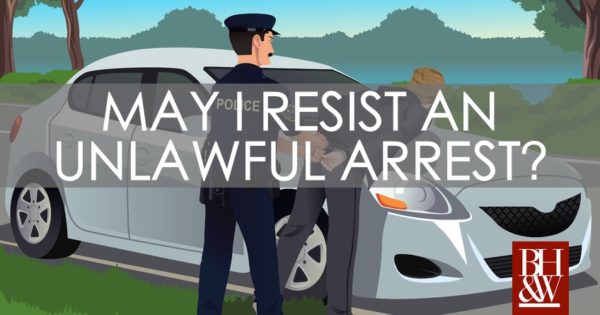
 In general, resisting arrest occurs when a person attempts to interfere with a peace officer’s duties.
In general, resisting arrest occurs when a person attempts to interfere with a peace officer’s duties. 
 Barnett Howard & Williams PLLC recently completed a full renovation of the historic Atelier Building (1905) in downtown Fort Worth. The Atelier Building is one of the oldest buildings in downtown Fort Worth, Texas that stills stands today. Built in 1905, the Atelier Building housed several different businesses over its 112-year history, including architects, banks, and a restaurant at one time. Located on 8th street between Houston and Throckmorton, the Atelier Building is marked by its dual terra-cotta fireplaces and marble facade.
Barnett Howard & Williams PLLC recently completed a full renovation of the historic Atelier Building (1905) in downtown Fort Worth. The Atelier Building is one of the oldest buildings in downtown Fort Worth, Texas that stills stands today. Built in 1905, the Atelier Building housed several different businesses over its 112-year history, including architects, banks, and a restaurant at one time. Located on 8th street between Houston and Throckmorton, the Atelier Building is marked by its dual terra-cotta fireplaces and marble facade.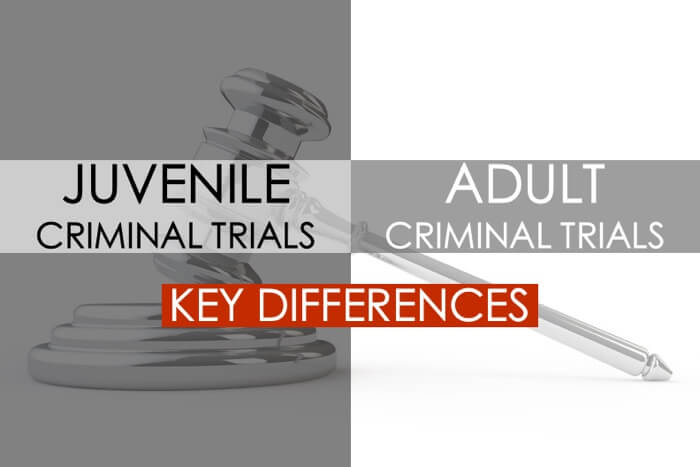
 The juvenile justice system is a hybrid system. Juvenile proceedings are technically civil in nature, but they incorporate many elements from the criminal system. The reason for this separate system is to teach children that they will be held responsible for their actions without labeling them as criminals. The differences between adult and juvenile trials is a direct result of this difference in systems.
The juvenile justice system is a hybrid system. Juvenile proceedings are technically civil in nature, but they incorporate many elements from the criminal system. The reason for this separate system is to teach children that they will be held responsible for their actions without labeling them as criminals. The differences between adult and juvenile trials is a direct result of this difference in systems.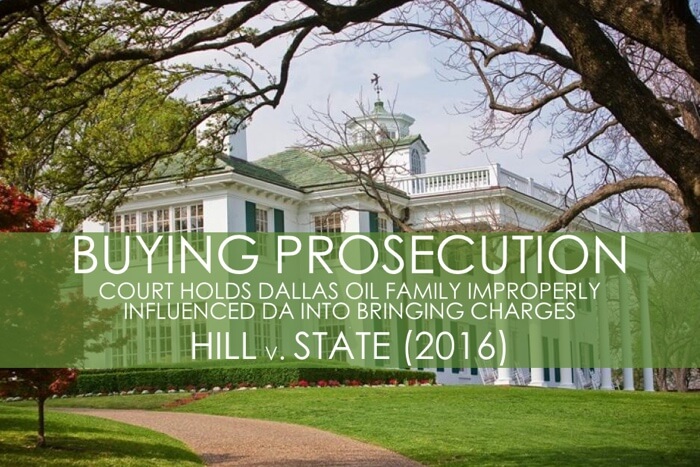
 On September 21st the Texas Court of Criminal Appeals issued a decision on the oil tycoon heir Albert Hill III’s criminal appeal. The question the Court faced was whether it was in the trial court’s discretion to conduct a pretrial evidentiary hearing on Hill’s motions to quash and dismiss based on prosecutorial vindictiveness. The Court determined that it was within the trial court’s discretion to conduct such a pretrial evidentiary hearing and that discretion was not limited by the defendant meeting “a certain threshold evidentiary requirement.”
On September 21st the Texas Court of Criminal Appeals issued a decision on the oil tycoon heir Albert Hill III’s criminal appeal. The question the Court faced was whether it was in the trial court’s discretion to conduct a pretrial evidentiary hearing on Hill’s motions to quash and dismiss based on prosecutorial vindictiveness. The Court determined that it was within the trial court’s discretion to conduct such a pretrial evidentiary hearing and that discretion was not limited by the defendant meeting “a certain threshold evidentiary requirement.”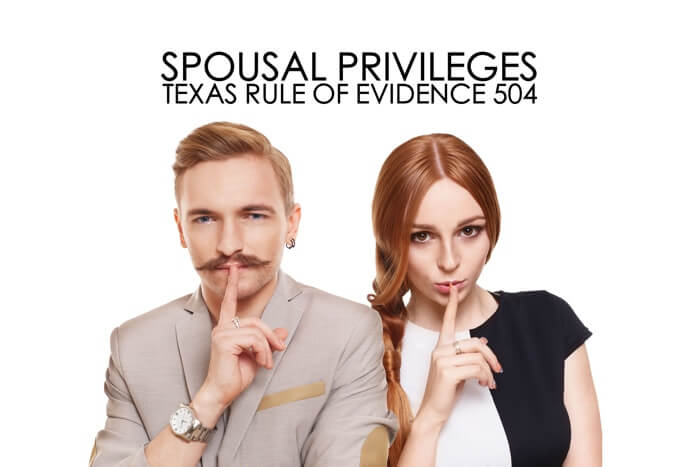
 Everyone knows (or should know) of the attorney-client privilege which prohibits the calling of an attorney to testify as a witness against his client and protects the attorney-client relationship. But what about the husband-wife relationship? Are spouses afforded any protection from having their spouse testify against them in a criminal trial?
Everyone knows (or should know) of the attorney-client privilege which prohibits the calling of an attorney to testify as a witness against his client and protects the attorney-client relationship. But what about the husband-wife relationship? Are spouses afforded any protection from having their spouse testify against them in a criminal trial?
 In the age of social media it seems more and more that our identities are being fast tied to what we post, like, love, or retweet on social media. Our firm handles criminal cases on a daily basis and in the course of our work we’ve seen an increasing reliance by law enforcement and prosecutors on social media websites like Facebook, Twitter, and Instagram. More often than not, investigators are scrolling through the entirety of a person’s social media profiles scouring the information for incriminating statements, pictures or conversations. A Facebook picture or an Instagram post that one might consider innocent, humorous, or obscure could end up being a key piece of evidence used against that person in a court of law.
In the age of social media it seems more and more that our identities are being fast tied to what we post, like, love, or retweet on social media. Our firm handles criminal cases on a daily basis and in the course of our work we’ve seen an increasing reliance by law enforcement and prosecutors on social media websites like Facebook, Twitter, and Instagram. More often than not, investigators are scrolling through the entirety of a person’s social media profiles scouring the information for incriminating statements, pictures or conversations. A Facebook picture or an Instagram post that one might consider innocent, humorous, or obscure could end up being a key piece of evidence used against that person in a court of law.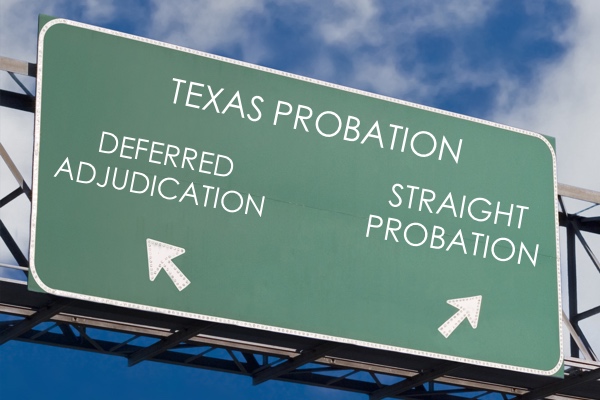
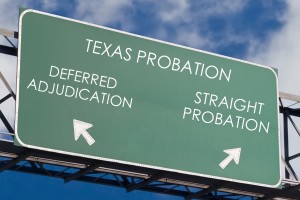 When we are counseling new clients, we routinely address the punishment range that is available for the charged offense and whether probation is an option in their case. It is important to note that all criminal offenses (except class C citations) are punishable by incarceration. However, first-time offenders and those charged with misdemeanors and non-aggravated felonies will often receive probation when prosecutors, judges, and juries agree that community supervision (probation) is a better alternative to jail time in the given situation. For some offenses, however, probation is not an option (see our previous article on
When we are counseling new clients, we routinely address the punishment range that is available for the charged offense and whether probation is an option in their case. It is important to note that all criminal offenses (except class C citations) are punishable by incarceration. However, first-time offenders and those charged with misdemeanors and non-aggravated felonies will often receive probation when prosecutors, judges, and juries agree that community supervision (probation) is a better alternative to jail time in the given situation. For some offenses, however, probation is not an option (see our previous article on 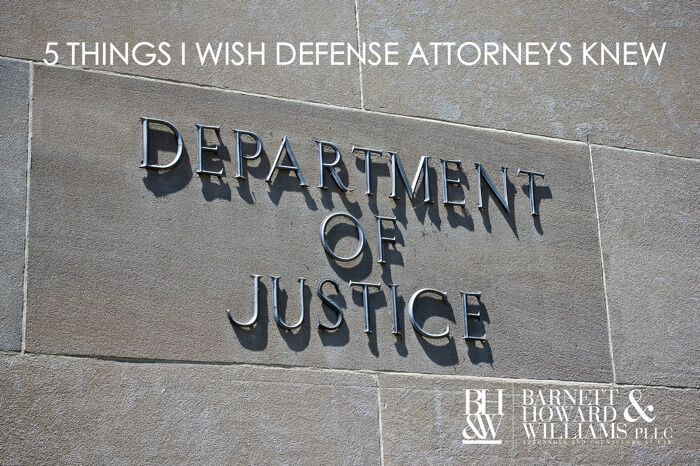
 Glen. R. Hines (
Glen. R. Hines (







